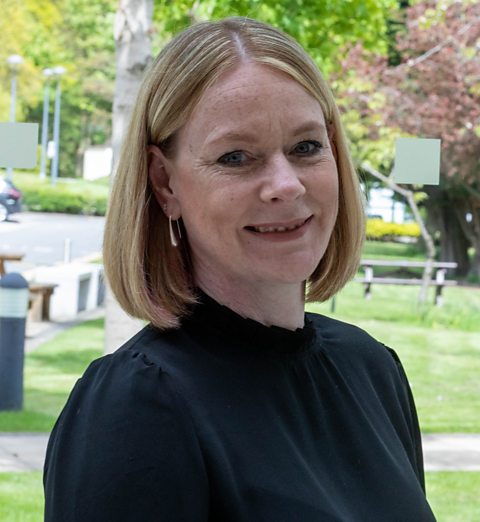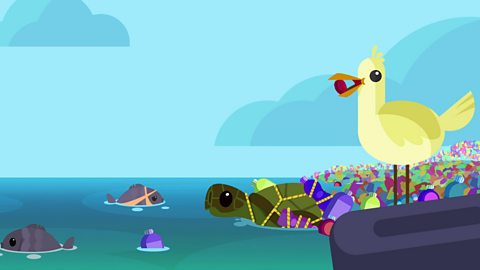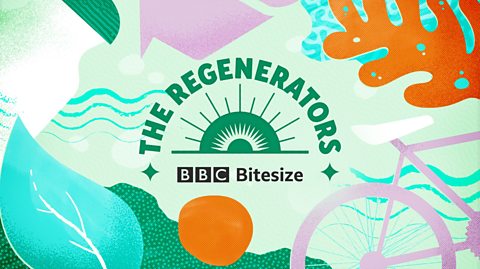
Environmental, sustainability and climate education is not standalone, it is not an add-on.
By Dr Leigh Hoath, Senior Professional Practice Fellow at Leeds Trinity University, and educational consultant for Bitesize: The Regenerators Green Classroom resources
Following COP26 in Glasgow in November 2021, climate change has never been more in the media.
There is a need for us all to take action to tackle it, and it is key that our young people are able to understand the reasons for doing this and what they can do.
Itβs not just a topic for teaching in school in a particular subject: itβs also about making small changes in our behaviour to make a really big and positive difference.
I think we often wonder how and why we can make climate change part of what we are doing in the classroom. Here are some hints and tips about making use of your limited time in order to help learners make more sense of these big issues.
Bringing climate change into the classroom
An important part of environmental, sustainability and climate change education is that the learners are able to see the links with their own lives.
All too often the global nature of these issues means that learners donβt make the connection with their own actions because the impact of climate change is not having a detrimental effect on the life they are leading.
In the early years we need to be promoting a love of our environment and then as we move through KS1 and KS2 we can begin to introduce more of the βknowledgeβ behind the issues we are hearing about and facing. There are no children too young to begin to learn about this.
This should be the first step to encouraging children to βact local and think globalβ so they can see that the actions they take will make a contribution to the whole issue. It is also key that there is a βsolution focussedβ approach to these topics.
Eco-anxiety is a real issue for pupils and so it is important to explain the issues in a way that engages young people to be βbotheredβ enough to want to do something without causing too much worry and concern.
The nature of the issues mean that there are various ways to link them with subjects discretely or to teach them through a cross-curricular or themed approach.
The key here is to ensure that the topic is linked to existing curriculum content β for example disappearing land mass links with geography, the causes of climate change links with history or science, and the statistics and numbers can be used to form part of mathematics lessons.


Helping learners to understand
Teachers want curriculum content they teach to make sense to pupils.
It is no different with climate and environmental education.
But how can we do this?
The approach that has been outlined above means pupils are not seeing these global issues in isolation but rather as an everyday part of what they are doing.
Seeing how their learning in the classroom mirrors the work of scientists, environmentalists, statisticians etc further supports them in seeing they can be part of the solution.
Environmental, sustainability and climate education is not standalone, it is not an add-on. Integrated it into everyday teaching will enable it to become part of their lives, leading to a change action which will bring about a positive change.

Practical tips
We all know that one of the greatest pressures for teachers is time β and you might be thinking, how on earth do I fit all this in?
Careful planning is needed. It is about βboxing cleverβ with time.
I do not believe that this is something that should only be taught in science. The key issues should be integrated across a range of subjects for the reasons already outlined.
The environmental issues should be used as a context for teaching rather than being tagged on β this makes it more meaningful and less onerous for you as a teacher.
Another approach which is worth considering is using a big question (What is climate change? Why is climate change an issue? How is the environment changing due to human impact?) and exploring this in different subjects.
What about looking at this from a religious or moral perspective? Is there a difference in how we would find out more about a big question such as 'what is climate change?'
This approach can be adopted and used in all subjects within the curriculum to show that is not the responsibility of one sector in society. The is really helpful.
Using the Green Classroom resources
The Regenerators resources are versatile and are designed to support developing understanding of key issues both at school and at home.
They include lesson plans covering topics across the primary curriculum which can be used to introduce themes and offer context for existing planning within the school. The content can offer a foundation for exploring the bigger issues β the lessons are engaging, accessible and age differentiated.
The Problem with Plastics lesson is a good starting point!
Another possible starting point is the Bitesize: The Regenerators β Climate Change Live Lesson which introduces activities around climate change and is a springboard for further activities.
From the classroom there is the option to take this learning home.
There are many small steps which can be taken through the support of the Make a difference part of the campaign which again offers age-specific activities which will enable young people to see that this is not just a school-based issue or something they just have to learn about, but something that needs to filter throughout their whole lives.
We all know that one of the greatest pressures for teachers is time β and you might be thinking, how on earth do I fit all this in?
Watch again: Bitesize: The Regenerators β The Green Planet Live Lesson 1. video
Bring the wonders of The Green Planet into your classroom with this tropical plant themed science lesson for 7-11 year-olds.

UN Climate Change Conference (COP27) - Teaching Resources. collection
To support teaching around COP27 we put together this collection of resources for use in your primary or secondary school classroom.

The Regenerators. collection
ΒιΆΉΤΌΕΔ Bitesize has launched The Regenerators, an ambitious new initiative that will educate and inspire children, young people and families to take simple steps to build a greener future.
